Melissa Morgan // Like Minds
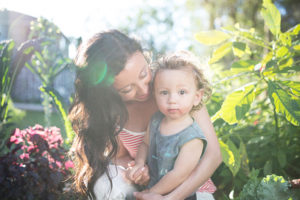 If they needed a poster girl for ‘zero-food-waste-cafe superheroes’ saving food scraps one closed loop system at a time, Melissa Morgan is your superwoman. She’s committed, she’s sassy and she’s got gumption. Mel is one half of community cafe Like Minds. Together with her partner Jimmy they nurture Avoca Beach locals with thoughtfully produced food and coffee and a generous, warm dose of themselves. Mel is a goddess of ‘slow living’ but doesn’t shy away from the complex reality of reducing and disposing of waste produced by a cafe kitchen. A life long learner who humbly teaches through her experiences, Mel is intentional about putting love into the food she cooks, which must be why it tastes so damn good. We caught up to talk about the taboo word of the hospitality industry, how to break bad-bin-habits, why you should be mindful with chocolate cake and eat it too and a special Christmas Day recipe that will make you the star.
If they needed a poster girl for ‘zero-food-waste-cafe superheroes’ saving food scraps one closed loop system at a time, Melissa Morgan is your superwoman. She’s committed, she’s sassy and she’s got gumption. Mel is one half of community cafe Like Minds. Together with her partner Jimmy they nurture Avoca Beach locals with thoughtfully produced food and coffee and a generous, warm dose of themselves. Mel is a goddess of ‘slow living’ but doesn’t shy away from the complex reality of reducing and disposing of waste produced by a cafe kitchen. A life long learner who humbly teaches through her experiences, Mel is intentional about putting love into the food she cooks, which must be why it tastes so damn good. We caught up to talk about the taboo word of the hospitality industry, how to break bad-bin-habits, why you should be mindful with chocolate cake and eat it too and a special Christmas Day recipe that will make you the star.
Words: Jessica Oldfield
Photography: Yoss Oldfield
Beauty: Tira Jaye
JO: What’s growing in the Like Minds garden at the moment?
MM: That’s so funny I just wrote a list the other day…kale, curry leaves, mint, thyme, garlic chives, chillies, bananas, limes, lemons, kaffir lime, basil
JO: You’ve got a real lemony herb too?…Jimmy made me taste it.
MM: Lemon verbena or pineapple sage, it smells so good, I want to make a syrup with it! What else have we got…? Oregano. Peppermint. There’s so much at the moment.
JO: What’s the story behind Like Minds? How did it start?
MM: It started because we wanted to create a space where people in the community could meet, drink coffee, connect. I think every community should have a place where people can feel like it’s their ‘local.’ We wanted a space that felt like it was an extension of our home, where everybody is known by their name and we wanted to share really good food and coffee.
Classic Singlet in White // Distressed Skinny Jean // Boxy Denim Jacket
JO: Growing food for the kitchen, was that a big part of the plan all along?
MM: Yes that was really important. The first thing we did was build 5 garden beds, before we even renovated the interior! We were just so lucky to have a garden next to the coffee shop and that space was one of the biggest things that attracted us to the place. We came back here a few times just to see how much sun it got. The soil in Avoca is really good too, we’ve had really good luck. It took us 3 days to build the garden beds and the community came and helped and asked what’s going on. One of our neighbours would walk past with his dog everyday and after we put the beds in and planted all the seedlings he came around and asked us: ‘are you going to build a fence?’ And we said: ‘no, there’s already a small fence.’ And he said: ‘Well people are going to steal your herbs.’ And we said: ‘well thats the whole point.’ We want to share, inspire and show the journey of food. I’m constantly coming out to the garden to fill a bowl with herbs. I literally run out of the kitchen, pick some mint, chop it up, put it on a plate and then someone is eating it a few seconds later. That journey is really beautiful. Obviously it’s hard work and a challenge, we’ve had a few months where the herbs or veggies haven’t done well and we’ve had to outsource them. But we’ve met lots of locals who share their garden produce with us, and we trade for coffee, we also get produce from local farmers/growers, theres actually a lot growing on the Central Coast. In the summer the garden looks really green and abundant and in the winter we have less.That’s something we should all understand: eating seasonally is really important and preparing for the seasons too.
JO: And has a reality…
MM: Yeah like people always want avocado! And in Australia we’re so spoilt for them, but this year we had those big storms that affected the farms. We couldn’t get good quality avocados, so we just put pumpkin smash on the menu and everyone enjoyed it and they’re fine with it, but it’s that understanding and accepting that that’s just how it is. Our menu is really small and that’s so we can focus on just a few things and especially helps with managing our waste, not bringing too much in. And also giving people less options again, making people aware of the reality of the journey of food. And we don’t need so many options. Options are just a luxury in our would and I think people really like that; coming in and not feeling bombarded by so many choices. We always wanted to keep it really simple.
Classic Scoop Neck Tee in Pink Tie Dye // Classic Wash Boyfriend Jean
JO: It’s nice when people will give their trust to whoever’s in the kitchen and just enjoy the philosophy of the cafe and what’s on offer.
…Just going back to waste…how specifically do you manage your waste?
MM: Well we always wanted the garden to be educational and a model not just for people in their homes but for other businesses as well. It’s really hard working in hospitality because the reality is sad, there’s so much waste. It’s our responsibility as people in business to serve good quality food but it’s also our responsibility to put energy into reducing our footprint. You only need to go out the back of an RSL club and see their bins and it’s [the waste] just insane. So for us when we started we thought we would just have a couple of compost bins, maybe a few worm bins, but we found that our waste as we got busier was accumulating. At first we just had a little pot of food scraps at the end of the day and we were like ‘oh we can deal with this, the worms can deal with that, the chickens can eat this’ and now we’re taking home big buckets everyday. Waste management has just been a step by step journey for us. ‘Cause we didn’t have anyone come in and give us a model to work on it’s just been our own journey and we’ve done that through experimenting, talking to others and researching. So we divide a lot of our scraps…a lot of them go to our chooks at home and some of them go to the worm bins we have onsite. And then whatever the chooks don’t eat we turn over and it goes straight back into the earth. We’re always looking for people who would take food scraps from us.
JO: Yeah ’cause people have done that in the past?
MM: Yeah we had a local guy who lives across the road who was taking it 3 days a week for his chooks and we’ve got a neighbour who’s taking one bin each week for chooks and compost. But as we get busier we’re faced with more challenges. Like having new staff and trying to change someones habits, 20-years worth of habits. You can’t just click your fingers and say: ‘there’s the onions, there’s the lemons, this is how we divide our waste.’ Because sadly the majority of people just throw everything into the garbage. For Jimmy being conscious of waste is really part of who he is now, to connect with other businesses and inspire them to be more thoughtful on their waste. So then we got to a point where there was too much waste, our chooks were getting a heavy load of all this stuff, our garden was starting to smell a little bit like ‘little India’ so we started to think how can we reduce our waste more. So now we’ve started being more creative in the kitchen, we use the whole veggie or fruit, with citrus fruits we use the zest to flavour our muesli and cakes and then we dehydrate the fruit or cold press juice them. We caramelise leeks and then instead of throwing the green tops out, we slice them finely and crisp them up and they get used on all the dishes!…Possibilities are endless! I’m encouraging our cooks to be creative, using what we have, rather than buying more in all the time. A cook asked me to order some spring onions the other day, and I told him we have so much garlic chives in the garden could he do something with that instead.
JO: It’s inconvenient at first when you’re trying to be more thoughtful about waste…
Striped Singlet in Red Stripe // White Boyfriend Jean
MM: Well that’s the challenge. When we have new staff, we’re starting at square one again, where we were only four years ago. I don’t get angry or upset with people, because I know I was once there and it’s all habitual and what we’ve all been taught. I get excited about showing them what they can do to live more consciously. Im constantly learning too.
JO: It’s unlearning.
MM: Yeah unlearning, out with the old habits and replacing them with better ones. Everybody has their own journey. So for people who feel like they don’t have the time, you just start with step one and once that is integrated into your life and you’re comfortable then you take step two. Everything’s just a process. I know people who are here and they want to be at step five and they’re going to fail ’cause I think it’s really important to take that journey and do it so you do it in your own capacity. And you understand the process a bit more then.
JO: What’s your food philosophy?
MM: I’ve found that’s been a journey for me as well. I guess when we started I just wanted to have real food, whole foods. I didn’t want to open packets, or use poorly processed foods. I wanted to know the quality of the product and the produce and create something with it. Some days I would have the best produce, I made a dish once with organic swiss brown mushrooms, I simply stir fried them with some garlic and shallots. It’s a no brainer, but when I put them on the plate they looked so sad and lifeless. I realised I wasn’t cooking with love or care that day. So I guess it’s about celebrating whole foods and seasonal produce, but equally as important its about the energy while you’re cooking. I’m really mindful now when Im in the kitchen and to simply enjoy the act of cooking. I like to come to work and set intentions for the day ahead, Ill say ‘today the food is going to nourish and make people happy’. We get an organic box every week so I’m inspired by what’s in season, I follow some recipes but I’ll substitute ingredients with what we have. My cooking is very much whats on hand and what we pluck from the veggie garden. Ive made the most exciting dishes from improvising.
Classic Scoop Neck Tee in Pink Tie Dye // Classic Wash Boyfriend Jean // Single Velvet Strand in Rouge
JO: You mentioned to me a couple of days ago that being mindful of how you eat is equally as important as what you eat?
MR: Yeah definitely. ‘Cause we’re not crazy health freaks [laughs] We eat good food, but we eat a variety and a diversity of foods and I think that’s important. We enjoy a piece of chocolate cake, I don’t necessarily think that’s bad. I think if you have something and you’re eating it with stress or guilt then you’re eating that emotion as well. But if you eat it deservingly, with care and with gratefulness then you’re eating that emotion as well. If you’re eating with family, with friends, and celebrating food and life then I think that’s just the best!
JO: Speaking of family, who’s in your family?
MM: Well we recently made our own little family…so that’s Jimmy and this is Sol and he’s 19 months. We started a business and then had a baby, we’re crazy! We’re also lucky to have Jimmy’s family who live up here, my family live in Sydney and then we have our wider family, our friends and our community.
JO: What’s your favourite spice?
MM: That’s a good one. Oh my gosh. I guess…I love cinnamon. But I don’t think I could have one favourite. At the moment I’m learning the benefits of Ayurvedic spices, so healing spices. So I might be drawn to a certain spice during a season ’cause it’s warming or I’m drawn to another because Im feeling low and need to use a spice to boost our immune system. So I definitely go through different phases. But we always use a lot of cinnamon, turmeric, fennel and cumin. I just started sprouting fenugreek seeds actually.
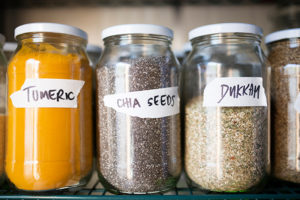 JO: Does sprouting them help take away the bitterness?
JO: Does sprouting them help take away the bitterness?
MM: I haven’t tried them yet. I’ve just got a whole jar of them and I think they’ll be ready tomorrow. They smell amazing. I tried to sprout chickpeas last week and I failed miserably.
JO: I had your beetroot cured salmon for breakfast the other morning. So good! I thought that would be a beautiful dish for people’s Christmas spread, can you share the recipe?
MM: Yeah it’s really, really easy. Go to a fishmonger and get a whole one side of salmon. Ask them to pin bone it for you but keep the skin on. To cure it, all you need is sea salt and sugar. So put the salmon skin down in a tray and then rub a layer of salt all over the fish. Then a layer of sugar all over. Then grate some peeled beetroot, preferably organic if you can get it. Mix it with zest from two lemons and you could also add in a little horseradish or juniper berries. So you press down the beetroot mix and then cover with a layer of cling wrap and place another tray on top of it and put some weights in the top tray, like a heavy pot. Then just let it cure in the fridge for two days. Take it out, wash it off, slice the skin off with a really sharp knife and then slice it to however thick you want it. The thinner the better and you get this beautiful red colour on top from the beetroot and the pink of the salmon. And you can literally do that two days before Christmas. You can serve it with some smashed avocados, fresh herbs and lemon.
JO: Delicious. I love an easy but impressive looking dish. Which cooks inspire you?
MM: Like famous people?
JO: No it can be anyone, it can be your next door neighbour…
Classic Singlet in White // Distressed Skinny Jean // Boxy Denim Jacket
MM: Well Lynnie my next door neighbour cooks with a lot of love and care, she’s always coming round with cakes. I love what the guys from Cornersmith do using traditional methods, like pickling and fermenting. The Grown and Gathered couple…people like that really inspire me, ’cause it’s not just about what’s ended up on the plate it’s about the journey to the plate and they’re not about diets or fads, they are just celebrating real food. Of course Jimmy inspires me too! He’s probably cooked more dinners than me since we’ve had Sol. I love watching him cook, he rolls up his sleeve and jumps around the kitchen throwing herbs here and a splash of wine there.
JO: Has travel inspired what you’re doing?
Strappy Maxi Dress in Black // Single Velvet Strand in Rouge
MM: Yeah we went to India before we started Like Minds and that was really inspiring. We didn’t have heaps of money, we just had a really great idea that came from our heart. In India there’s people that are just so inventive and entrepreneurial in their own capacity. So for example there’s a guy with a bike and he knows how to cook pancakes, so he rides around and finds busy street corners to cook his little roti breads on, just doing what he can because he has an idea and he believes in it. We ordered prawns one night at a street stall in Kerala and the owner said 10 minutes, so we were like: ‘sure we’ll wait…’ and the prawns arrived in a little esky on the back of a fishermans motorbike, he just caught them. The chef cooked them over a fire, he was dripping with sweat, and he served them with the most memorable spicey sauce. You can’t get more fresh than that! Im still trying to replicate that sauce! So I guess travelling’s good to keep the creative energy flowing, to experience different flavours and the people that cook them. I’ve definitely used more spices since being in India and Sri Lanka. When we were in Sri Lanka we lived with a local family and watched them cook curries everyday…the simplicity of just adding spices to a pot with coconut and leaving it for a while and then coming back and eating the most divine food. Our garden’s been influenced by that trip, we planted two curry leaf trees, a kaffir lime and a chilli plant. I would love one day to grow our own spices. Imagine growing vanilla, cardamon and pepper.
JO: So that’s the plan for the future?
MM: Yes! A medicinal spice farm.
Visit Like Minds

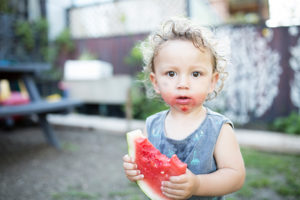
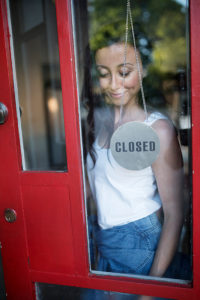
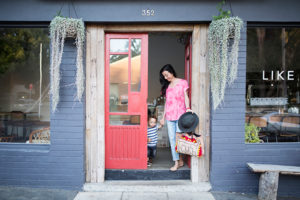
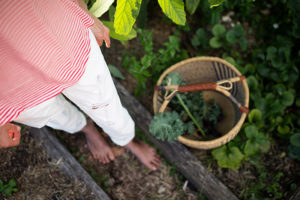
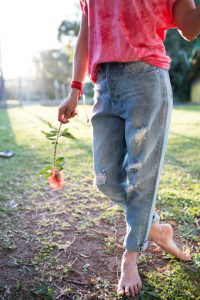
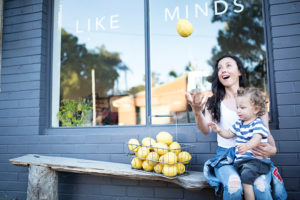
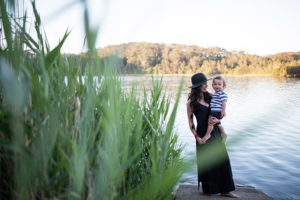
0 comments